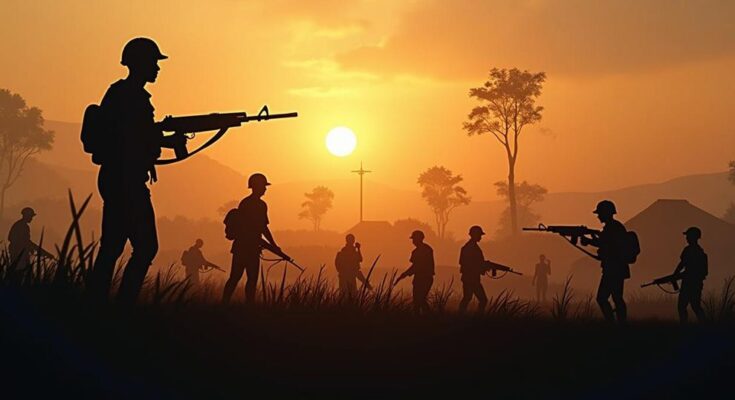Human Rights Watch reported that the Rwandan military and M23 rebel group have shelled displaced persons camps in eastern Congo, committing significant abuses against civilians. The report highlights the complicated landscape of violence driven by multiple armed factions as millions remain displaced. Rwanda’s military presence in the region is a contested issue, with Congo filing a case against Rwanda for violations of sovereignty. President Tshisekedi has called for sanctions against Rwanda, reflecting the escalating tensions.
A report by Human Rights Watch indicates that the Rwandan military, alongside the M23 rebel group it supports, has been indiscriminately shelling camps for displaced people in eastern Congo. Human Rights Watch accused both the Rwandan forces and Congo’s military of committing severe violations against civilians, including killings and rapes, while exacerbating the vulnerabilities of displaced populations. The report highlights that artillery deployed near these camps by Congo’s army has put displaced individuals at greater risk. Eastern Congo has been plagued by violence, with over 120 armed groups vying for control, leading to the displacement of approximately six million individuals. The M23 group, primarily composed of ethnic Tutsis, separated from the Congolese army over a decade ago and has a history of violent engagements, including a significant offensive in 2012 that temporarily seized Goma. Allegations persist that Rwandan forces actively support M23, contributing to the conflict’s intensity; Rwanda, however, maintains that its military presence is a matter of national security. A case has been initiated by the Congolese government against Rwanda in a regional court for purported infringements on Congolese sovereignty, amidst calls from President Felix Tshisekedi for sanctions on Rwanda due to its backing of M23.
The humanitarian crisis in eastern Congo is exacerbated by ongoing armed conflicts, with numerous factions competing for dominance over territory and resources. This struggle has resulted in widespread human rights abuses, including mass killings, sexual violence, and systematic obstruction of humanitarian aid, affecting millions of civilians. The M23, a rebellious entity allied with Rwanda, has played a significant role in the violence that has destabilized the region. Tensions between Rwanda and Congo have historical roots, particularly related to issues of ethnic identity and geopolitical interests in the Great Lakes Region. Rwanda’s admission of troop presence in Congo stems from security concerns regarding the build-up of Congolese forces near its borders, further complicating the already tense relationship between the two nations.
The infringement of humanitarian rights in eastern Congo highlights the complexity of the regional conflict involving Rwanda and various militant groups. The accusations against both Rwandan forces and the Congolese military underscore the dire circumstances faced by displaced individuals, revealing a cycle of violence that threatens stability in the region. As both sides engage in ongoing hostilities, international scrutiny and local demands for accountability are likely to persist, impacting diplomatic relations and humanitarian efforts.
Original Source: apnews.com




